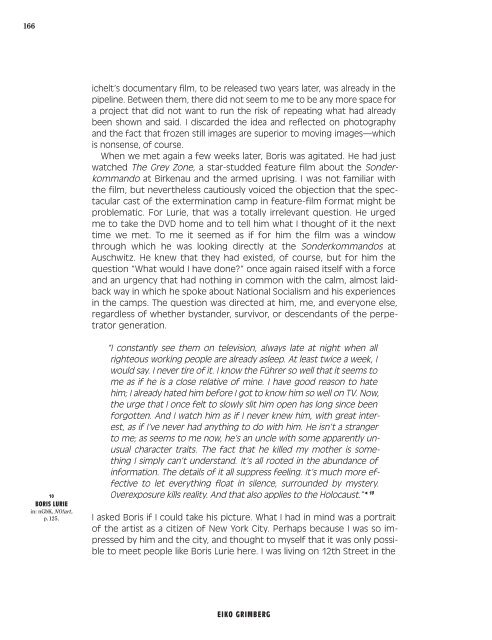The Art of
Katalog_Boris-Lurie_English
Katalog_Boris-Lurie_English
You also want an ePaper? Increase the reach of your titles
YUMPU automatically turns print PDFs into web optimized ePapers that Google loves.
166<br />
ichelt’s documentary film, to be released two years later, was already in the<br />
pipeline. Between them, there did not seem to me to be any more space for<br />
a project that did not want to run the risk <strong>of</strong> repeating what had already<br />
been shown and said. I discarded the idea and reflected on photography<br />
and the fact that frozen still images are superior to moving images—which<br />
is nonsense, <strong>of</strong> course.<br />
When we met again a few weeks later, Boris was agitated. He had just<br />
watched <strong>The</strong> Grey Zone, a star-studded feature film about the Sonderkommando<br />
at Birkenau and the armed uprising. I was not familiar with<br />
the film, but nevertheless cautiously voiced the objection that the spectacular<br />
cast <strong>of</strong> the extermination camp in feature-film format might be<br />
problematic. For Lurie, that was a totally irrelevant question. He urged<br />
me to take the DVD home and to tell him what I thought <strong>of</strong> it the next<br />
time we met. To me it seemed as if for him the film was a window<br />
through which he was looking directly at the Sonderkommandos at<br />
Auschwitz. He knew that they had existed, <strong>of</strong> course, but for him the<br />
question “What would I have done?” once again raised itself with a force<br />
and an urgency that had nothing in common with the calm, almost laidback<br />
way in which he spoke about National Socialism and his experiences<br />
in the camps. <strong>The</strong> question was directed at him, me, and everyone else,<br />
regardless <strong>of</strong> whether bystander, survivor, or descendants <strong>of</strong> the perpetrator<br />
generation.<br />
10<br />
BORIS LURIE<br />
in: nGbK, NO!art,<br />
p. 125.<br />
“I constantly see them on television, always late at night when all<br />
righteous working people are already asleep. At least twice a week, I<br />
would say. I never tire <strong>of</strong> it. I know the Führer so well that it seems to<br />
me as if he is a close relative <strong>of</strong> mine. I have good reason to hate<br />
him; I already hated him before I got to know him so well on TV. Now,<br />
the urge that I once felt to slowly slit him open has long since been<br />
forgotten. And I watch him as if I never knew him, with great interest,<br />
as if I’ve never had anything to do with him. He isn’t a stranger<br />
to me; as seems to me now, he’s an uncle with some apparently unusual<br />
character traits. <strong>The</strong> fact that he killed my mother is something<br />
I simply can’t understand. It’s all rooted in the abundance <strong>of</strong><br />
information. <strong>The</strong> details <strong>of</strong> it all suppress feeling. It’s much more effective<br />
to let everything float in silence, surrounded by mystery.<br />
Overexposure kills reality. And that also applies to the Holocaust.” 10<br />
I asked Boris if I could take his picture. What I had in mind was a portrait<br />
<strong>of</strong> the artist as a citizen <strong>of</strong> New York City. Perhaps because I was so impressed<br />
by him and the city, and thought to myself that it was only possible<br />
to meet people like Boris Lurie here. I was living on 12th Street in the<br />
EIKO GRIMBERG



